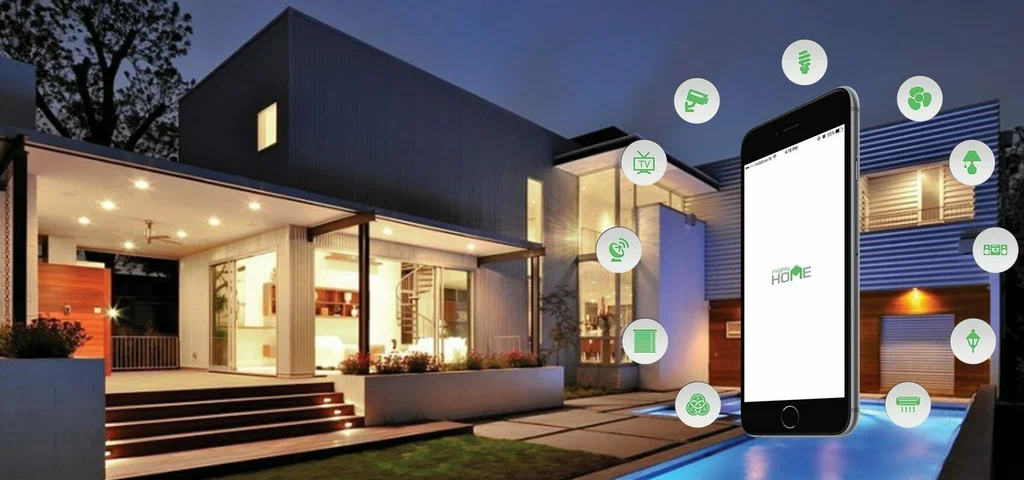In recent years, Smart Home Features in Real Estate has made significant strides, reshaping the real estate market and how homeowners interact with their properties. With the integration of advanced technologies, real estate buyers and sellers are increasingly focused on homes that offer convenience, security, and energy efficiency. As a result, smart home features have become a key selling point in the market. Let’s explore how these features are transforming the real estate landscape.
What Are Smart Home Features?
A Smart Home Features in Real Estate is one that uses Internet of Things (IoT) technology to enable homeowners to control various aspects of their home environment remotely, often through a smartphone or voice-controlled device like Amazon Alexa or Google Assistant. These systems connect devices in the home to the internet, allowing automation, remote control, and data collection. Common smart home devices include:
- Smart Thermostats: Devices like the Nest Thermostat learn homeowners’ preferences and adjust temperatures accordingly, helping to save energy and reduce utility bills.
- Smart Lighting: Systems such as Philips Hue allow homeowners to control the lighting remotely, change colors, and set schedules.
- Smart Security Systems: These include cameras, doorbell cameras, and motion sensors, which can be monitored remotely for added security. Ring and Nest Hello are popular examples.
- Smart Locks: Keyless entry systems like August Lock let homeowners lock and unlock doors remotely, enhancing both security and convenience.
- Smart Appliances: Kitchen gadgets like refrigerators, washing machines, and ovens can now be monitored and controlled through mobile apps, improving convenience and efficiency.
- Voice Assistants: Devices like Amazon Echo or Google Home integrate all smart devices and offer hands-free control for a range of functions, from playing music to adjusting the thermostat.
Why Smart Homes Are a Hot Commodity in Real Estate
- Increased Convenience and Control: Homebuyers are drawn to smart homes because they offer a new level of convenience. Automated systems save time and provide more control over various aspects of daily life. For example, smart lighting can adjust based on time of day, while thermostats learn household routines and adjust the temperature accordingly. This ease of control, combined with remote monitoring capabilities, is a huge selling point.
- Energy Efficiency and Sustainability: As environmental consciousness grows, many homebuyers prioritize energy-efficient and sustainable solutions. Smart home devices help minimize energy consumption by learning habits and adjusting accordingly. For instance, smart thermostats and energy-efficient lighting reduce heating, cooling, and electricity costs while decreasing the overall carbon footprint.
- Enhanced Security: Security is a top concern for homeowners, and smart home features offer increased peace of mind.
The Growing Demand for Smart Homes
The demand for smart homes is rising steadily, and with it, the demand for homes equipped with advanced technological features. According to a 2023 report from the National Association of Realtors (NAR), over 70% of real estate agents stated that home buyers are interested in properties with smart home features. More homebuyers are looking for homes that provide integrated technology that makes life easier and more connected. This trend is expected to continue as technology continues to evolve.
Furthermore, many homebuyers are willing to pay more for homes with these advanced features. A recent survey from the Consumer Technology Association (CTA) showed that 25% of homebuyers are willing to spend up to $5,000 more for a smart home. With new generations becoming more tech-savvy, the desire for smart homes is only expected to increase in the coming years.

Challenges to Adoption
While the adoption of smart homes continues to rise, there are some challenges to consider. One of the biggest hurdles is the initial cost of installing smart home technology. Smart home devices and systems can require a significant upfront investment, and some buyers may be hesitant to pay extra for features they feel they don’t need. Additionally, smart home systems can sometimes face compatibility issues, where different devices or platforms don’t work well together.
Security and privacy concerns are also significant. Smart home devices collect a wealth of personal data, which could be vulnerable to cyberattacks if not properly secured. Buyers may be wary about giving third-party companies access to their home networks. As such, the development of more robust privacy and security standards for smart home technology is essential.
Future of Smart Homes in Real Estate
As technology continues to advance, the future of smart homes in real estate looks bright. Innovations in artificial intelligence, 5G connectivity, and automation will lead to even smarter, more intuitive home systems. Expect more seamless integration between devices, with homes capable of learning and anticipating homeowner needs in real-time.
The future could also see smart homes become even more accessible, with lower costs and increased interoperability between devices. Additionally, real estate agents may start to provide virtual tours of homes that highlight smart features, giving potential buyers a fully interactive experience from anywhere in the world.


Pingback: big houses for sale
Pingback: Future Real Estate Trends: What Buyers Need to Know
Pingback: Smart home architectural designs
Pingback: Modern house design in coimbatore
Pingback: Innovative Architectural Designs